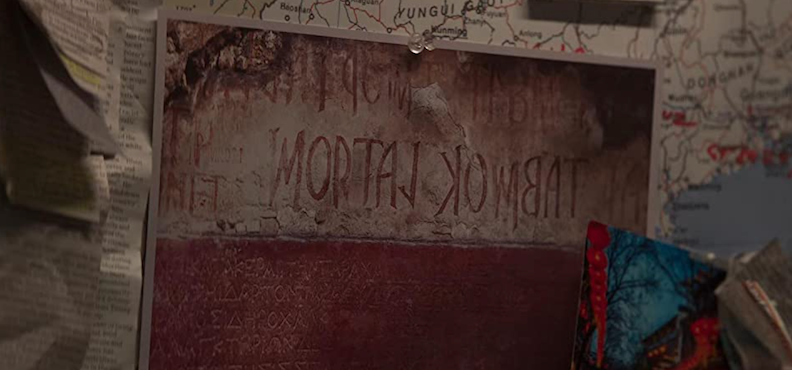The celebrated video game series gets another live-action feature film that felt like it was more concerned with establishing a motion picture franchise than it was telling its own story.
Mortal Kombat (2021)
Directed by Simon McQuoid
Screenplay by Greg Russo and Dave Callaham
Story by Oren Uziel and Greg Russo
There have been close to a dozen Mortal Kombat video games released since the last time the franchise had a live-action movie back in 1997. Dozens of characters have spilled buckets of blood as these super-powered warriors battled with the fate of Earth in their hands. Deadly Alliances were forged and the timeline has been rebooted and rebooted again.
There have been a few attempts at making a third Mortal Kombat film over the last couple of decades, trying to capitalize on the popularity of the video game series, but they all petered out like a complicated Fatality attempted by a novice player. Considering how bad 1997’s Mortal Kombat: Annihilation was, I can’t say I’d be in a rush to bring another film to the masses either. But we’re in a new generation, where CGI is vastly improved and younger studio executives who all grew up with the video game – which debuted in 1992 – as part of their lives. Mortal Kombat was ripe for another go at a big-screen narrative, and finally director Simon McQuoid gave it a shot.
Much like 1995’s MORTAL KOMBAT, it wasn’t a flawless victory, but it certainly was a fun film, filled with bloody fatalities, broken bones and many homages to nearly 30 years of video game moments.
The new film centers around sorcerer Shang Tsung’s attempts to secure his realm’s 10th victory in the Mortal Kombat tournament, a win that would allow Outworld to invade the Earth realm. Shang Tsung, though, subverts the rules a little bit, sending his warriors to kill Earth realm’s champions before the tournament even begins. The sorcerer fears a prophecy that the bloodline of Hanzo Hasashi – a Feudal Japanese fighter whose family was murdered by the man who would become Sub-Zero in the film’s opening – would rise up for the 10th tournament and defeat Outworld.
Since Hanzo Hasashi’s bloodline was spared when Bi-Han/Sub-Zero didn’t kill Hasashi’s daughter, who was spirited away by Raiden, the god of lightning, Shang Tsung’s fears were justified. Though there was no way he could know that. Other than the prophecy, I suppose.
Hasashi’s ancestor is where Simon McQuoid’s film diverges from the game’s storyline, introducing failed cage fighter Cole Young as the every man focus of the film. Young – who bears a dragon birthmark as his admission to the Mortal Kombat tournament – gets sucked into this strange world when he’s attacked by Sub-Zero and saved by Jax, who sends Young to find Sonya Blade. Once he finds her, she uses her prisoner Kano to lead them to Lord Raiden’s temple. There, the action gets underway.
For all the talk of the upcoming generational Mortal Kombat tournament, we don’t actually get an official tournament in the movie. Shang Tsung’s attempts to murder Earthrealm’s champions and Raiden’s countermeasures take the place of any kind of official tournament. As Shang Tsung explains, the elder gods who oversee the tournament are apathetic to his machinations, which makes me wonder why he doesn’t just invade Earth anyway. It doesn’t seem like there would be any ramifications for his actions if he invaded and managed to conquer Earth. Why bother trying to rig a tournament that would allow for the invasion if you can just send an army to conquer the world?
Despite the video game franchise’s penchant for some deep story modes since the 2011 soft reboot, a cohesive narrative isn’t what people want or need from Mortal Kombat. The series is all about over-the-top action and violence, with broken bones, blood and guts going everywhere. On that front, the movie delivers in spades. More than a dozen Mortal Kombat characters from various points in the series are introduced in the film, with teases for even more to come in potential sequels. More movies in the franchise seem like a lock, as so much of the film felt like a set-up for a series. There are still several popular fighters who can be introduced in a second film – including Johnny Cage, who was very clearly teased in the film’s closing moments.
Holding off on introducing Cage – who has been a vital player in the Mortal Kombat mythology – until a second film felt like an odd choice, especially since most of Cole’s story could have been done for Cage with some minor tweaks. But it does give a hook for the hypothetical second film. And hey, maybe the sequel will actually give us an official Mortal Kombat tournament!
Mortal Kombat (2021) is currently in theaters and available for home streaming on HBO Max.
